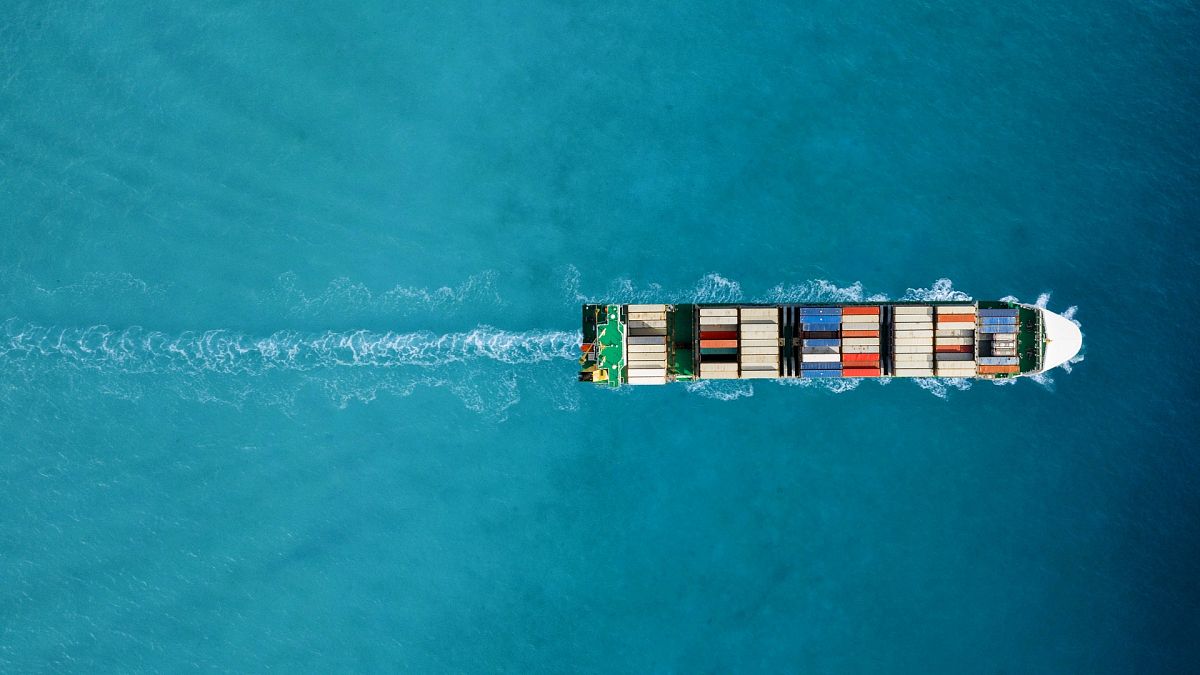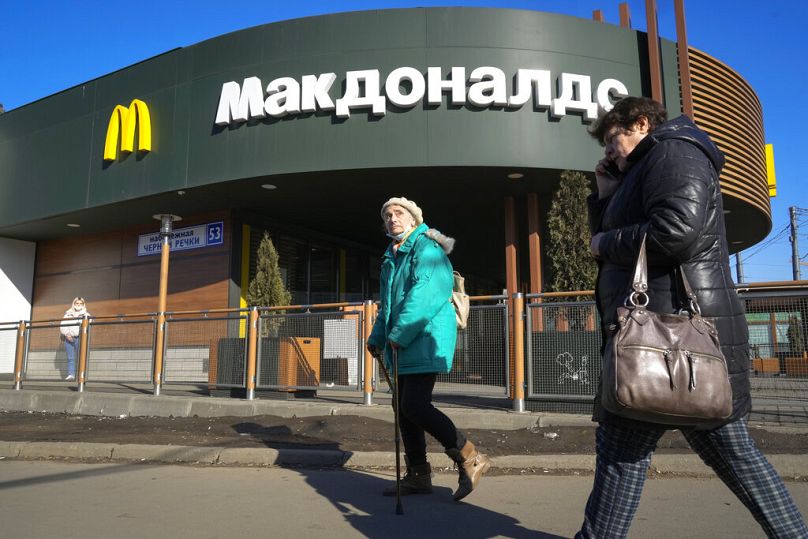Some conspicuous absences exist in the West's sanctions regime against Russia, allowing it to contine raking in a fortune.
After Russian troops poured across Ukraine’s border in February 2022, the West slapped a raft of sanctions on Russia - on a scale not seen since the dark days of the Cold War.
A Yale University study that year claimed the measures, which targeted a sweep of individuals, goods and services, were “catastrophically crippling” the Russian economy, citing the ruble's collapse and mass exodus of Western firms.
Russia has since shown resilience, however.
Its GDP - an indicator of economic health measuring the total value of goods and services a country produces - is predicted in a Reuters poll to rise 0.7% in 2023, all the while other European economies splutter and decline.
There are many reasons for Russia's economic robustness. But some suggest one is that sanctions have too many blindspots, loopholes and cracks, limiting their ability to hit Russia where it hurts - in the pocket.
“There are plenty of gaps in the existing sanctions regime,” Tom Keatinge, Director of the Centre for Financial Crime and Security Studies at Royal United Services Insitute, tells Euronews.
First up is the “financial system” where “banking channels to deal with Russia” remain open in the West, he highlights.
While these are ostensibly to pay for energy imports (still allowed in some cases), Keatinge says transactions are “very hard to police”, suggesting payments for oil and gas could mask purchases of other items, such as high-tech military goods.
“If you are a bank, it can be hard to really know what the underlying trade a payment is connected to,” he explained.
“Frankly, these remaining channels are overdue being closed down.”
The same goes for companies involved in other sectors with more of a humanitarian bent, such as food and pharmaceuticals, Keatinge continues.
“There’s always a risk that a batch of medicines or similar good being exported could act as a cover for something less benign.”
“I am not against leaving humanitarian loopholes if they are acknowledged and policed properly,” he adds.
'Bankrolling Russia’s war machine'
Another gap says the analyst is that many specific industries remain sanctions-free.
Diamonds are one such example. Though the United States and United Kingdom have applied restrictions, the European Union (EU) continually leaves the precious stones off its Russia sanctions list, now in their 11th incarnation.
This allows the world’s biggest diamond producer continued access to one of its key markets.
“Governments are struggling to figure out how to close those loopholes in a way that isn't too hard on their own pockets,” Keatinge tells Euronews, saying Belgium's desire to protect its diamond industry helps explain Brussels' slow application of restrictions.
Still, he cautions sanctions are a complex issue.
Despite much “distasteful” trade carrying on, Keatinge notes some "is very challenging to cut, like the ongoing trade in nuclear fuel."
The AP news agency reported in August Moscow was earning hundreds of millions of euros selling nuclear fuel to the US and Europe, which are entirely dependent on Russian products.
Not slapping sanctions on some other goods, such as medicines for Russian civilians, also "makes perfect sense" as it could pose a “huge propaganda own goal” for the West, Keatinge adds.
Fundamental to this issue are arguments about how sanctions work and their ultimate purpose - irrespective of what they target or don't.
“It is wrong to suggest sanctions are an all-or-nothing thing,” Keatinge emphasises. “It's clearly not true that you have to sanction everything everywhere in order for them to have any effect. Lots of restrictions have been put in place."
"But the system does, nonetheless, have cracks, where money and trade, like water, will find its way through,” he explains.
“We need to limit the number of cracks to the greatest extent possible - and recognise that if they do exist they leave material gaps in our defences - but that doesn't completely undermine the sanctions regime, they are clearly having an impact.”
'It's economic war'
While welcoming scrutiny of what was missing from the West's sanctions regime, Mark Harrison, Emeritus Professor of Economics at the University of Warwick, says the "important thing" was that there was one in the first place.
“The real purpose of economic warfare is to ramp up costs for an adversary by forcing them to make adaptations," he tells Euronews. "It is not possible to seal off the Russian economy."
"What we can do is continually make it more expensive for Russia to maintain its ties with the rest of the world."
"Modern economies are very tough targets. That doesn't mean it's not worth attacking them. It means countries need realism and patience," he says.
Russia's prized fossil fuel revenues - upon which its economy depends - dropped by more than a quarter in January 2023 compared to the previous year, according to the International Energy Agency.
A final issue with the West's sanctions regime the experts raise is that third countries aren't covered, allowing Russia to circumvent them.
This blindspot means states, notably Turkey, Kazakhstan and India, can act as intermediaries where sanctioned goods pass through their territory to or from Russia.
“Many in Europe have overlooked the fact that the target of sanctions, Russia, doesn't sit there and say okay," says Keatinge. "They restructure and reorganise."
India has ramped up purchases of Russian crude oil, which some allege is sold as a refined product to help Moscow evade sanctions, according to a Euronews report in May.
New Delhi has defended itself, claiming it cannot pay for more expensive energy imports from countries beyond Russia with millions living in poverty.
“If you block off trade by one route, it just finds another way,” details Harrison. He cites the historical example of World War One where exports were “simply rerouted” through neutral European countries after Britain imposed a naval blockade on Germany.
'Some countries have a bad rep when it comes to sanctions'
Even amongst Western allies of Ukraine, Keatinge suggests sanctions lack “consistency”, with some countries buying petroleum products more actively than others, plus a few Russian banks can still use the SWIFT payment system.
“It doesn't make a mockery of the sanctions, but it certainly makes it far more difficult to have any certainty the restrictions are being properly imposed,” he tells Euronews.
Led by ultra-nationalist Viktor Orban, Hungary has gained notoriety for continuing to purchase Russian energy, while some worry sanctions fatigue is gripping Austria, with one political party saying last October restrictions should be put to a referendum.
“Sanctions are a political tool,” Keatinge says. “If the leadership in your country is not putting out strong messaging on sanctions, then why would industry feel the need to comply.”
The EU signalled in July its sanctions against Russia will build over time, with the bloc seeking to patch holes and curb new loopholes as and when they arise.
These could extend to penalising countries that aid Russia, though this is not certain.
“It's a war of attrition," says Harrison. "By subjecting Russia to costly workarounds and stretching its resources, we weaken the country both at home and on the battlefield."
"That's the point. That's the purpose here."

